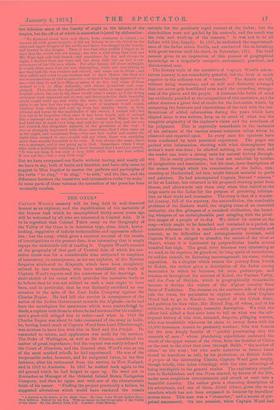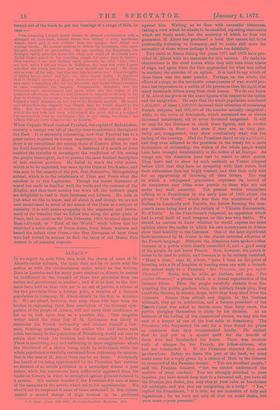THE OXUS.*
CazrAis WOOD'S memory will be long held in well-deserved honour as an explorer, and the republication of his narrative of the famous task which he accomplished thirty-seven years ago will be welcomed by all who are interested in Central Asia. It is to be regretted that Colonel Yule's essay on the Geography of the Valley of the Oxus is in deterrent type, close, black, heavy- looking, suggestive of tedious technicalities and oppressive official- ism ; but the essay, which gives a succinct account of the results of investigations to the present date, is so interesting that it amply repays the undeniable toil of reading it. Captain Wood's account of the geography of that part of Central Asia of which his nar- rative treats was for a considerable time subjected to suspicion of inaccuracy, in consequence, as his son explains, of the Russian forgeries attributed to Klaproth, which have been completely refuted by late travellers, who have established the truth of Captain Wood's reports and the correctness of his drawings. A short sketch of his career which precedes the narrative leads us to believe that he was not utilised as such a man ought to have been, and in particular, that he was distinctly sacrificed on one occasion to the spite of the East India Company against Sir Charles Napier. He had left the service in consequence of the action of the Indian Government towards the Afghans—as he had been the mouthpiece for assurances which were contradictvil by deeds, a rupture with those to whom he had answered for his country- men's good-will obliged him to retire—and when in 1819 Sir Charles Napier was about to take command of the army in India, he, having heard much of Captain Wood from Lord Ellenborough, was anxious to have him with him in Sind and the Punjab. He consented to return, and application was made for his services. The Duke of Wellington, as well as Sir Charles, considered the matter of great importance ; but the request was curtly refused by the Court of Directors, and the General cites Wood's case as one of the most marked rebuffs he had experienced. He was of the irrepressible order, however, and he emigrated twice, in the first instance, after his retirement from the service, to New Zealand, and in 1852 to Australia. In 1857 he worked back again to the old ground which he had helped to open up. He went out to Kurrachee as Manager of the Oriental Inland Steam Navigation Company, and then he again met with one of the characteristic trials of his career. "Finding the project practically a failure, he suggested alterations which would have rendered the vessels * A Journey to the Source of the River Oxus. By Capt. John Wood, Indian Navy. New Edition. Edited by his Son. With an Essay on the Geography of the Palley of the Oxus. By Col. Henry Yule, C.B. London : John Murray.
suitable for the peculiarly rapid current of the Indus; but the shareholders were not guided by his counsels, and the result was the ruin and wind-up of the concern." It was not to be all failure with him, happily. In 1861, he undertook the superintend- ence of the Indus steam flotilla, and conducted the uniertaking with great success until his death, in November, 1871. The brief memoir gives us an impression of this pioneer of geographical knowledge as a singularly energetic, enthusiastic, practical, and disinterested man.
The literary style of the narrative of Captain Wood's adven- turous journey is not remarkably graceful, but the book is mush superior to the ordinary run of "travels." The details are full, without being wearisome, and so well and distinctly arranged that one never gets bewildered even amid the exceeding strange- ness of the places and the people. A business-like habit of mind has evidently presided at the composition of this narrative, and the editor deserves a great deal of credit for the foot-notes, which, by comparing the forecasts and observations of the text with the con- firmations of added information during the years which have elapsed since it was written, keep us in mind of what was the complete originality of the explorer's views and the soundness of his judgment. This is especially remarkable in the instances of his estimate of the various almost unknown tribes whom he observed and reported upon. In every case his opinions have been confirmed by later practical experience. The pages are packed with information, showing with what thoroughness the author's work was done ; he allowed nothing to escape him, and the reader can trace a strong taste for natural history through- out. He is rarely picturesque, he does not embellish by touches of imagination and association ; but his clear, terse descriptions of the scenes through which his examination of the Indus, com- mencing at Haiderabad, led him, might furnish material to poets and painters. He had accompanied Captain Burnes' " mission " so far as Lakhat, but returned to his proposed starting-point from thence, and afterwards met them only when they halted at the large marts on the Indus for the purpose of procuring informa- tion on their trade and commerce. The story is that of a wonder- ful journey, full of the mystery, the contradiction, the unsolvable problems of the Eastern world, the mighty ruins of an unstoried antiquity, the dim glimpses of a vanished civilisation, the haunt- ing whispers of an undecipherable past mingling with the primi- tive usages of a people of to-day. We follow its course on the map—which ought to be detached and contained in a pocket, as constant reference to it is needed—with growing curiosity and interest, as its difficulties and entanglements increase, until Captain Wood is obliged to abandon the ascent of the river at Sharki, where it is buttressed by perpendicular banks several hundred feet high. The great river becomes very interesting as we read, in its caprices, its grandeur, its long spells of smoothness, its sudden tumult, its flattering encouragement, its stern, violent opposition. In a chapter which relates the journey from Attock to Kohat, the author gives a description of the Indus among mountains in which he becomes, for once, picturesque, and remains so throughout his account of Kabul, the Par wan Valley, and the Pass of Hajijah, which is geographically remarkable because it divides the waters of the Afghan country from those of Turkistan. The streams on the northern side of this pass join the Oxus, for permission to explore which river Captain Wood had to go to Kunduz, the capital of the Uzbek State, and petition its then ruler, Mir Mired Beg, of whom, and of his subjects, he gives a strange, romantic description. We wish the editor had added a foot-note here to tell us what was the sub- sequent history of this wise, taleuted, despotic, pillaging warrior, who was irresistible wherever he chose to swoop down with his 15,000 horsemen inured to predatory warfare ; who was famous for the true kingly faculty of "quickly penetrating into the counsels of men ;" whose plundering expeditions embraced the
whole of the upper waters of the Oxus, from the frontier of China on the east to the river that runs through Balkh, "the mother of cities," on the west ; but who made countries in former times
closed to travellers as safe, by his protection, as British India. A propos of the interesting Usbeks, Captain Wood goes deeply,
though briefly, into Asian ethnology, with the rare advantage of being intelligible to the general reader. The exploratory expedi- tion to Badakhshan and the Oxus started, by favour of the Mir, under most auspicious circumstances, and struck at once into a beautiful country. The author gives a charming description of his attendants, and one of them, Abdul Ghoul, gives rise to an anecdote which has not been surpassed in humour by travellers' stories since. This man was a "character," and a source of per- petual amusement. On one occasion, when Captain Wood had turned out of the track to get the bearings of a range of hills, he says :—
" On returning I found Abdul Ghuni in earnest conversation with a stranger on horseback, behind whom was sitting a very handsome female slave and it was evident from his manner that Abdul was waxing wroth. He seemed anxious to detain the horseman, who, upon his part, insisted on proceeding. On my nearing the disputants, the itranger rudely gave his horse the whip, and went off at a brisk pace. Abdul Ghuni gazed on the receding couple for some time in silence ; then turning to me and sighing most piteously, he said, 'Alas, alas ! my lord. when I left my house in Talikhan, the very last order I gave was that she whom you have just seen should not be sold. My other slaves were all for sale ; but this one, this favourite one ! I had thoughts of taking her to wife !' and hero the sighs began again. It appeared that in Abdul's absence, a Khurm slave-dealer had visited Talikhan, and made a tempting offer for the favourite, and Abdul Ghani's brother at once concluded the bargain. Unspeakable, therefore, was the bereaved one's astonishment and grief, when she, the object of his tenderest affections, whom he had pictured to himself as already at the door to welcome his return, was thus unexpectedly encountered, seated behind a burly stranger, on her way to the Bokhara market. He raved, and swore that the transfer was illegal, that he would appeal to the Mfr. But the thought of twenty-six golden tillas (about £17) for which the fair lady had been sold calmed his grief, and in a resigned but melancholy tone he exclaimed, 'She is too cheap, too cheap ! the villain will get forty tines for her in Khurm.' "
When Captain Wood reached Fyzabad, the capital of Badakhshan, scarcely a vestige was left of the city onceso celebrated throughout the East. It is especially interesting, now that Fyzabad has to a great extent regained its former importance, in which respect its story is an exceptional one among those of Eastern cities, to read his vivid description of its ruins. A residence of a month at Jerm enabled the traveller to investigate the conditions of life among the people thoroughly, and to present the most finished description of this curious province. He failed to reach the ruby mines, which is to be regretted, but came up the Oxus at Ish-Kashm, and was soon in the country of the yak, that distinctive, distinguishing animal, which is to the inhabitants of Tibet and Panfr what the reindeer is to the Laplander. Though the recent literature of travel has made us familiar with the traits and the customs of the Kirghiz, and thus their novelty has worn off, the author's pages are delightful to read in their freshness and fullness. He tells us just what we like to know, and all about it, and though we are not now accustomed to think of the source of the Oxus as a subject of curiosity, it is with entire sympathy in the eagerness and excite- ment of the traveller that we follow him along the great plain of Panfr, and on, until on the 19th February, 1838, he stood upon the Bam-i-Daniah, or "Roof of the World," while before him lay stretched a noble sheet of frozen water, from whose western end finned the infant river Oxus,—the first European of later times who had visited its sources to find the story of old Marco Polo correct in all material respects.











































 Previous page
Previous page